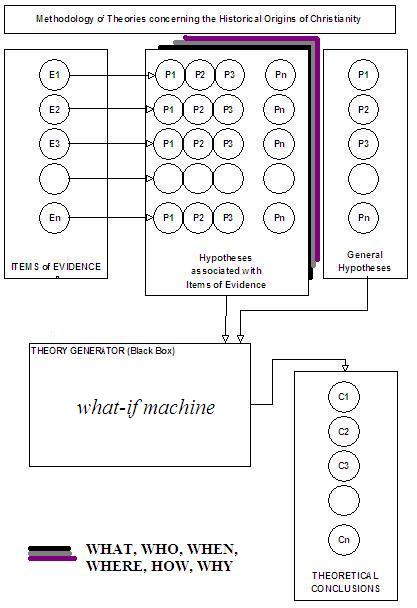
 |
Freethought & Rationalism ArchiveThe archives are read only. |
|
|||||||
|
|
Thread Tools | Search this Thread |
|
|
#101 | ||||
|
Contributor
Join Date: Mar 2006
Location: Falls Creek, Oz.
Posts: 11,192
|
Quote:
|
||||
|
|
|
|
#102 | |
|
Contributor
Join Date: Mar 2006
Location: Falls Creek, Oz.
Posts: 11,192
|
Quote:
Ditto for any other set of postulates about Pauline letters .... |
|
|
|
|
|
#103 | ||
|
Contributor
Join Date: Feb 2006
Location: the fringe of the caribbean
Posts: 18,988
|
Quote:
One can postulate (make assumptions) about any matter to be discussed once it is understood that the postulate ( the assumption) itself does not resolve the matter. The postulate (assumption) that Paul wrote letters do not determine that Paul actually or probably wrote letters or existed as postulated (assumed) in the discussion. |
||
|
|
|
|
#104 | |
|
Veteran Member
Join Date: Sep 2005
Location: San Bernardino, Calif.
Posts: 5,435
|
Quote:
|
|
|
|
|
|
#105 |
|
Veteran Member
Join Date: Sep 2005
Location: San Bernardino, Calif.
Posts: 5,435
|
|
|
|
|
|
#106 | ||
|
Banned
Join Date: Sep 2011
Location: middle east
Posts: 829
|
Quote:
Quote:

|
||
|
|
|
|
#107 | |||||
|
Moderator - General Religious Discussions
Join Date: Dec 2004
Location: New South Wales
Posts: 27,330
|
Quote:
|
|||||
|
|
|
|
#108 | |
|
Contributor
Join Date: Mar 2006
Location: Falls Creek, Oz.
Posts: 11,192
|
Quote:
After some years of research it occurs to me that despite the diversity of all modern theories, with few exceptions, are coming up with the same (sometimes dogmatic ) theoretical conclusions C1, C2, C3 .... etc When we look at these conclusion they are of the general form, in very simple terms, like this: C1: Jesus was an important historical figure and religious leader. C2: The originating century of christian origins was the 1st century. another series of conclusions might read .... C1: Jesus was an embellished historical figure, and cant be reconstructed. C2: christian origins covers the 1st and 2nd century. another series might read ... C1: Jesus was not an historical figure, legends have been embellished. C2: The originating century of christian origins was the 2nd century. These three sample conclusions are simplifications of course, but the point is that they represent the bulk of all theories on the matter. WHAT-IF To what extent are these conclusions reflective of the postulates? Some but not all of the theorists are explicit and deal with the postulated related to their conclusion. The explicit postulate to the theoretical conclusions above would be for the first two "It is reasonable to assume that Jesus was an historical figure", while for the last one the hypothesis would have to be the antithesis of this. Namely "It is reasonable to assume that Jesus was not an historical figure". Therefore it appears to me that the entire field can be summarised by taking as postulates the answers to the following two questions ... (1) Are we to assume that Jesus was an historical figure? YES implies that "Jesus was historical" becomes our postulate. NO implies that "Jesus was not historical" becomes our postulate. (2) In which century did Christianity originate? Pick a box: 1st century, 1st and 2nd centuries, 2nd century, etc This simulates the conclusions of all theories in the field. Does it therefore follow that every theory in the field must in some manner either explicitly or implicitly follow the above simple process? It seems to me that every theory in the field are each making theoretical conclusions that are reflected entirely by their postulates. |
|
|
|
|
|
#109 | ||
|
Contributor
Join Date: Mar 2006
Location: Falls Creek, Oz.
Posts: 11,192
|
Quote:
In fact it is a necessary requirement that one must postulate (make assumptions) about any one item of evidence no matter how small or large because the evidence itself is never entirely self-explanatory (especially within this field dealing with the history of christian origins), and with a known chronology. The postulates selected or crafted are therefore of critical importance to the whole business of doing history. |
||
|
|
|
|
#110 |
|
Contributor
Join Date: Mar 2006
Location: Falls Creek, Oz.
Posts: 11,192
|
Updated schematic showing as separated ...
* postulates to be associated with each of the items of evidence and * general postulates. 
|
|
|
| Thread Tools | Search this Thread |
|